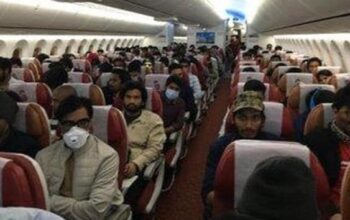The four countries have administered at least one dose of the vaccine to a large part of their populations, ranging from 58.7% for Mongolia to nearly 72% for Seychelles.
Seychelles, Mongolia, Chile and Bahrain took place in recent months on China’s vaccination diplomacy to propel their inoculation workouts and return to a version of the normality at the time of a pandemic.
The four countries have administered at least one dose of the vaccine to a large part of their populations, ranging from 58.7% for Mongolia to nearly 72% for Seychelles.
However, they are now fighting a new boost of Covid-19 infections that scientists should not happen.
Some experts say that one of the key reasons could be the vaccines themselves. The millions of doses provided by China in countries in recent months may not be very effective in containing coronavirus disease, particularly when faced with new virus variants that triggered epidemics in the regions of the whole world.
“If the vaccines are good enough, we should not see this model,” said Jin Dongyan, a virologist at the University of Hong Kong, “said New York Times, who first announced this on Tuesday.
“The Chinese are responsible for remedying that,” he added.
Others mentioned the scarcity of the emerging data from China, be it clinical trials for vaccines or efficiency and safety results. The country approved seven vaccines developed in the domestic market, including two of them for children under three years old.
Among these, the two largely made available worldwide – the shots developed by Chinese companies Sinovac and Sinopham – received the emergency emergency list of the World Health Organization (EU).
Sinovac’s coronavac shot has a low efficiency of 51% and 79% Sinopharm against symptomatic disease. On the other hand, Pfizer-Biontech and Moderna vaccines – mainly deployed in the Western world – have shown efficacy rates of more than 90% against symptomatic diseases in clinical trials.
The last weeks have seen cases skip in the four countries. Mongolia, which relies largely on Chinese vaccines, recorded 2,400 new infections on Sunday – a quadruple of one month ago.
In Seychelles – where the vaccination reader was largely based on Sinopharm – the number of new daily cases is greater than 716 per million, according to the NYT report. The country has administered at least one shot at nearly 72% of its population.
This too is a change from Israel, which vaccinated 63% (at least one shot) and where new daily cases are six per million of its population.
Similarly, an overvoltage of the virus in Chile has submerged hospitals and has prompted the government to expand the closure of the borders until June. Bahrain, where nearly 50% of the population is fully vaccinated and the most received the Sinopharm Jab, earlier this month, it allowed people to take a third shot of booster because it recorded a point of infections.
Officials from the four countries, however, for example, there may be other reasons for this increase in cases. A ministry of the Ministry of Health in Mongolia told NYT that the country has relaxed too quickly, adding that Chinese vaccines have probably prevented a serious illness and a higher mortality rate.
The Seychelles authorities also defended the vaccine.
The Chinese Foreign Ministry stated in a statement that there was no direct link between recent epidemics and vaccines and that the vaccination rate in some areas may not be high enough to prevent the distribution of the division.
William Schaffner, Medical Director of the National Infectious Disease Foundation at the University of Vanderbilt, told NYT that the efficiency rates of Chinese vaccines can be sufficiently low “to maintain some transmission … even if it keep people largely away from the hospital “.



